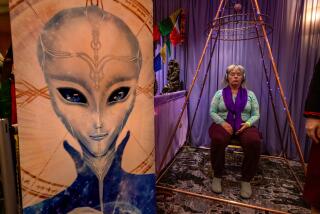Conference Calmly Prepares for the End of World--by 1996 : Doomsday: Members of Institute of Divine Metaphysical Research expect the earth to ‘rest.’ But they feel relief rather than fear.
- Share via
NORFOLK, Va. — Connie Roberson and her husband, Jimmy, don’t save for retirement or their children’s college educations. Victor Jackson, a senior at Cleveland State University, doesn’t worry about the job market.
That’s because they know something you probably don’t.
By 1996, the world is going to end in an instant.
Jackson and the Robersons were among about 1,000 people who attended the Institute of Divine Metaphysical Research’s conference, which ended here Sunday. The institute is based in Los Angeles and claims a nationwide membership of 5,600, mainly African Americans.
Those attending the group’s three-day event came from different parts of the country but hold in common the belief that the world will end within two years, when the earth will turn 7 days old--in God’s reckoning--and be ready for a rest.
How it will end, they don’t know. But end it will.
They believe the Creator’s plans began to unfold in 1931, when Henry Clifford Kinley, the founder of the institute, received a divine message.
With all of that looming on the horizon, one might think this crowd would be depressed, or at least a bit jittery. But just the opposite is true: Believers said that knowing their days are numbered gives them a profound sense of relief.
“It puts me into a more relaxed state of mind,” said Connie Roberson of Norfolk. “I don’t have as much pressure as the world would have, thinking they have to achieve so much.”
Jackson said: “I can’t look to long-range plans or anything like that. I just have to take it day by day, knowing the creation won’t be here in four or five years, knowing that there will be no world by the year 2000.
“Just to know you won’t have to deal with daily life anymore, to not have to be bothered by the cares of this world, is a relief. I’m definitely not sad about it.”
End of the world religious scenarios are nothing new. With a new millennium just around the corner, doomsday prognostications are increasing so quickly that an academic newsletter attempts to keep track of them.
But the Institute of Divine Metaphysical Research doesn’t consider itself a religion. It’s a school for people investigating the meaning of life.
Its leaders, who are called teachers and deans, say the institute encourages questioning. Mormons, Pentecostal Christians and leaders from any other religious group are challenged to attend meetings and present their views. Some have accepted. Hot debates ensue.
At any time, institute members know they may become the main event. The school believes that when believers are called upon to give a message, the Holy Spirit will deliver it through them.
On a recent Friday, Karen Morse’s name was called. Morse, of Richmond, Va., took the stage, clipped a microphone to herself and told hundreds of fellow believers that she was nervous.
Within minutes, however, she paced the stage while speaking with the authoritative cadence of a Jesse Jackson. For emphasis, she tapped one of eight giant murals behind her with a pointer. With almost cartoon-like drawings, the murals illustrated founder Kinley’s visions and teachings.
Morse’s main point was that Yahweh, or God, communicates to humanity through visions to prophets. Throughout her 45 minutes on stage, she quoted Scripture and occasionally criticized the beliefs of major religions, such as Christianity, while fellow believers took notes.
Many institute members used to be Christians, as was Kinley, a Church of God in Christ minister who renounced his beliefs after saying he met Yahweh in a vision in 1931. But the crowd also included former Muslims and Jehovah’s Witnesses.
Alonza Joyner, a former Baptist and the institute’s Virginia dean, said, “We happen to be privileged to be living at that time when creation is coming to a close.” He said the institute’s main attraction is to “escape the impending doom.”
“We’re not a cult,” said Robert Harris, the organization’s international dean, who studied under Kinley. “We don’t have people selling all they have and doing stuff like that.
“Look around. You can see how it is. They’re dressed well. They’re working people. No one is down in the dumps.
“They’re as happy as can be.”
More to Read
Sign up for Essential California
The most important California stories and recommendations in your inbox every morning.
You may occasionally receive promotional content from the Los Angeles Times.













